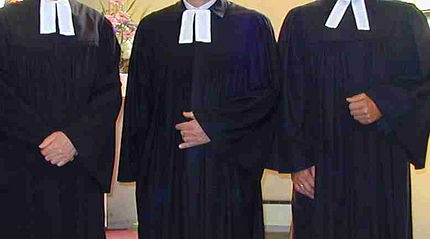Austrian Times
March 25, 2009
http://austriantimes.at/index.php?id=12040
 |
| Ninety per cent of Austrians support both Catholic priests’ right to marry and an end to the requirement that priests take a vow of celibacy at their ordination. |
Ninety per cent of Austrians support both Catholic priests’ right to marry and an end to the requirement that priests take a vow of celibacy at their ordination.
Seventy-two per cent said the Church should allow priests to marry, and 18 per cent said it should probably do so in a recent poll by the Linz market-research firm "market."
Sixty-eight per cent said priests should not have to take a vow of celibacy, and 22 per cent said they probably shouldn’t have to. Five per cent expressed support for a vow of celibacy, and five per cent had no opinion.
Ninety per cent of Catholics also supported priests’ exemption from a vow of celibacy.
Eighty-nine per cent of Austrians supported priests’ right to have children with their partners or wives.
Market polled 1,000 Austrians older than 16 years of age by telephone in mid-March.
The poll comes in the wake of the so-called "Friedl affair" over priestly celibacy.
Linz Bishop Ludwig Schwarz recently relieved Upper Austrian pastor Josef Friedl of his duties as a dean, or the bishop’s personal representative, for violation of his vow of celibacy.
Friedl, 65, a pastor in Ungenach who had recently publicly acknowledged that he had been having a relationship with a woman, met with Schwarz at the diocesan office in Linz last week.
Friedl said after the meeting he was no longer the bishop’s personal representative but didn’t want to say more.
Schwarz said after the meeting that Friedl had violated his vow of chastity as a priest, which was still in force. Schwarz noted that Vienna Archbishop Christoph Cardinal Schonborn, who was also chairman of the Austrian Bishops Conference, had recently reiterated the importance of celibacy for priests.
The bishop added that he would have more discussions with Friedl in the near future.
A recent poll conducted by Gallup for the Vienna daily "Osterreich" had basically the same results as the market poll. The Gallup poll showed 87 per cent of Austrians supported Catholic priests’ right to marry and only eight per cent did not, with five cent having no opinion.
The newspaper added there were around 700 priests in Austria without a formal position in the Church as a result of violations of their vows of celibacy.
The newspaper quoted theologian Paul Zulehner as claiming 22 per cent of Austrian priests had a relationship with women and said other sources put the percentage as high as 50 per cent.
Celibacy is only one of the problems facing the Austrian Catholic Church as it counteracts by conducting a so-called Easter communication offensive.
Schonborn kicked off the Catholic Church's Easter communication offensive on Monday this week, calling on Austrians to return to the basic message of the festival.
Schonborn said: "Many people no longer know why and how Easter should be celebrated. People are getting back to the basics because of the economic crisis. The core message of Easter is that death doesn’t have the last word. We all need hope, especially at a time like this. The economy also needs it, for, without hope, there is no economic prosperity."
Schonborn added the 1,600 large posters and 600 city lights prepared for the Easter offensive were worth 300,000 Euros but asserted that "not one cent" in contributions to the Church had been spent on the initiative, which several businesses had taken care of free of charge. The posters read: "Jesus Christ rose from the dead on Easter, a feast day of joy for mankind."
Armin Fehle initiated the Easter offensive with the success of a similar one before Christmas last year in mind. "Its echo was enormous," he said.
Schonborn had earlier appealed for understanding in a pastoral letter to Austrian Catholics at the end of the meeting of the country’s bishops almost two weeks ago.
The cardinal said: "Many people find it impossible to understand recent decisions by the Vatican, which have made some of them angry. I understand their reaction."
Schonborn added the Church needed to admit mistakes that had been made. "I appeal to you to remain on our common path," he said. Trust meant sticking together in bad as well as in good times, the cardinal claimed.
The cardinal also appealed to Catholics to contribute more money to the Church, noting that parishes, convents, schools and social institutions all needed support during the recession.
More reflection about the meaning of Easter may distract Austrians from thinking about Pope Benedict XVI.
Austrians have less regard for the Pope than they did two years ago in the wake of several affairs that have tarnished his reputation.
Twenty-six per cent of Austrians have a negative opinion about the Pope, versus 26 per cent who have a positive opinion and 48 per cent who have no opinion about him, according to the results of a recent poll.
A similar poll in 2007 showed 40 per cent of Austrians had a good opinion about him and only 16 per cent had a bad one.
The Pope’s standing is even worse among Austrian Catholics. Only 32 per cent of them have a positive opinion of him, compared to 50 per cent two years ago, and 23 per cent have a negative opinion of him, roughly twice as many as two years ago.
Only 17 per cent of Austrians regard the Pope’s statements about current problems as "very important or important," down from 29 per cent two years ago.
Church-going among Austrians remains stable at a low level. As was the case two years ago, 33 per cent attend services regularly or occasionally, 33 per cent do so once in a while, and 29 per cent never do.
Any original material on these pages is copyright © BishopAccountability.org 2004. Reproduce freely with attribution.